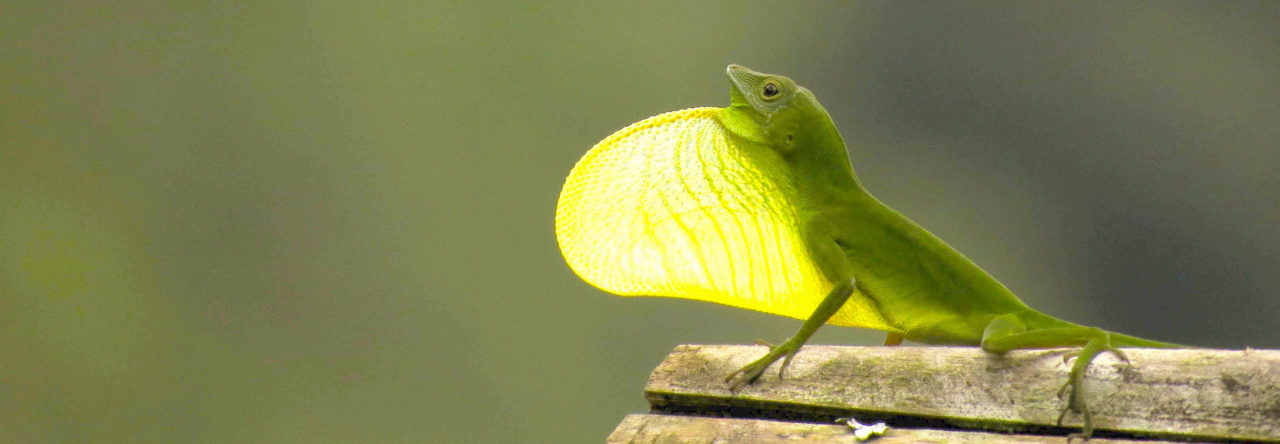
Our (fictional) anole tournament is nearing its end. The two semi-final matches concluded leaving only two anoles remaining. Who will be the ultimate champion, an island anole or a mainland anole?
Here’s the recap of the Final Four:
Winner match 25 (Anolis aquaticus) versus winner match 26 (Anolis frenatus)
In the rainforests of Columbia, Anolis aquaticus has ventured slightly out of his native range. Skittish from his previous streamside encounter with the giant Anolis insignis, he warily watches the canopy despite coming out on top in his last battle against Anolis limifrons. He is no stranger to Anolis frenatus, whose range extends north into Costa Rica, yet he fails to recognize the danger he is in as he climbs a tree towards a swarm of tasty insects. Out on a branch 10m up A. aquaticus gorges himself on the abundant food that tasted so much better than the streamside meals he was used to. Out of the corner of his eye, he sees the imposing form of Anolis frenatus move. More than twice his size, A. frenatus is a sight to behold. Anolis aquaticus quickly surveys his escape options. Seeing a stream below he rationalizes that he can escape if need be. He continues to gorge himself. Anolis frenatus is taken aback at the impertinence of this newcomer. He makes his way towards the branch upon which A. aquaticus is perched. Not willing to abandon his smorgasbord, A. aquaticus boldly stands his ground. He turns to face A. frenatus and begins to dewlap; perhaps this is a friendly giant that will want to avoid conflict. Anolis frenatus stops to size up this intruder and quickly determines that this tiny anole poses no threat to him. Anolis frenatus does not even bother to dewlap back. He continues on his path towards Anolis aquaticus, who stubbornly continues to dewlap and push-up in his cloud of tasty morsels. Anolis frenatus lunges at A. aquaticus, who instinctively turns and leaps without looking towards the stream. Anolis aquaticus sails through the air and lands safely in the water, or so he thinks. As he climbs onto a boulder, a fish-eating spider (Trechalea spp.) with a body size of nearly 17cm seizes the opportunity and leaps onto the unsuspecting and soggy anole. The spider makes quick work of the aquatic anole. Anolis frenatus watched from his high perch with a mouthful of delectable insects which he incidentally gobbled when he leapt at A. aquaticus with mouth agape. Anolis frenatus revels in his glory as he watches his competitor meet his end below. ***Anolis frenatus wins***
Winner match 27 (Anolis equestris) versus winner match 28 (Anolis bimaculatus)
A hurricane of unprecedented proportions has just ripped through the Caribbean. The Cuban Knight Anole, Anolis equestris, and the Panther Anole, Anolis bimaculatus, both find themselves washed up on an unfamiliar low-lying island. The waves periodically break over the island, washing away the debris on the ground. Both lizards quickly find a perch and scramble to escape an incoming wave. As the reach safety atop their scrubby perches, they catchy sight of each other. Clearly this island refuge has room for only one of them. Two lizards enter, one lizard leaves on this subsiding volcanic dome. They lock eyes and begin to dewlap. Nearly evenly matched it’s not clear who will claim this island as his new home. Anolis equestris extends his dewlap first. He unleashes a flurry of push-ups and rapid flashes of his cream colored dewlap. The slightly smaller Anolis bimaculatus has no choice but to stand his ground. He strains to extend his orange-yellow dewlap as far as he can. Unfortunately, his species has a disproportionately small dewlap for their size, and this A. bimaculatus is average sized at best. Anolis equestris, completely and utterly unimpressed, leaps from bush to bush with waves breaking over the rocky ground below him as he heads towards A. bimaculatus. Anolis bimaculatus makes an offensive move and lunges at A. equestris, who has by now reached the neighboring bush. Anolis bimaculatus lands a calculated blow on the abdomen of A. equestris. Despite the searing pain in his kidney, A. equestris reaches around and snatches A. bimaculatus in his forceful jaws. In one quick motion, A. equestris flings the slightly smaller A. bimaculatus over his shoulder and off the perch. Anolis bimaculatus hits the rocky ground and begins to sprint toward the nearest bush. At this moment a large wave crashes over him and carries him off the low-lying island. Anolis bimaculatus scrambles onto a floating log, but is immediately caught in the outgoing rip and is carried far into open water within moments. Anolis equestris watches A. bimaculatus ride the waves out of his life and weathers the remainder of the storm safely on his elevated perch, alone. ***Anolis equestris wins***
Which brings us to our dramatic conclusion: Anolis frenatus, representing the mainland, versus Anolis equestris, representing the islands!
- Puerto Rico Herpetology Symposium - September 21, 2023
- Anole Symposium This Fall? - July 14, 2023
- Parallel Urban Adaptation from Phenotype to Genotype in Anolis Lizards - January 20, 2023






Leave a Reply